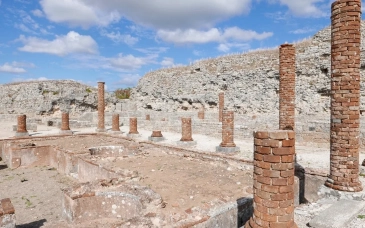The Lusitanian tribes, who inhabited the western Iberian Peninsula before Roman conquest, hold a unique place in the ancient world due to their distinct culture, beliefs, and practices. The religious life of the Lusitanians offers a captivating window into their identity, underscoring the profound impact of their spiritual traditions on both local and broader ancient European contexts. This post delves into the religious significance of the Lusitanian tribes, examining their beliefs, practices, deities, and how their spiritual life intersected with their daily existence and interactions with neighboring cultures.
1. Geographical and Cultural Context
The Lusitanians primarily occupied what is now modern-day Portugal, as well as parts of western Spain. The territory of Lusitania, which later became a Roman province, was marked by its rugged landscapes, dense forests, and strategic rivers. This environment not only shaped the economic and social structures of the tribes but also profoundly influenced their religious practices. The isolated nature of many Lusitanian communities contributed to the development of distinct local customs, creating a tapestry of varied yet interlinked spiritual traditions.
2. Pantheon of Deities and Religious Syncretism
The Lusitanian religious system was polytheistic, deeply rooted in the worship of natural forces and deities that governed various aspects of life. These deities were often associated with elements such as war, fertility, the earth, and celestial bodies. Some of the most significant deities included:
- Endovelicus: One of the most venerated gods, Endovelicus was associated with health, prophecy, and the underworld. His worship extended into the Roman period, showcasing the god’s resilience and adaptability. Temples dedicated to Endovelicus, such as the renowned sanctuary in Alandroal, Portugal, were centers for healing and divination, attracting pilgrims seeking guidance.
- Ataegina: A goddess of rebirth, fertility, and the underworld, Ataegina represented the cyclical nature of life and death. Her cult, particularly prominent in the southern regions, illustrates the Lusitanians’ belief in the renewal of life and the importance of natural cycles.
- Nabia: A deity connected to rivers and water, Nabia was revered for her association with fertility and abundance. The worship of Nabia underscores the vital role rivers played in sustaining life and trade within Lusitanian territories.
The Lusitanian pantheon often intertwined with that of their Celtic and Iberian neighbors, creating a rich blend of spiritual and cultural syncretism. This interaction influenced how the Lusitanian tribes shaped their religious iconography and rituals, blending indigenous and neighboring traditions seamlessly.
3. Sacred Sites and Ritual Practices
The Lusitanians were known for their worship in natural settings such as forests, caves, and near bodies of water. These sites were seen as the dwelling places of spirits and gods, embodying the tribe’s deep reverence for the natural world. Stone altars and carved inscriptions have been found at these sacred places, hinting at their religious ceremonies and sacrificial practices.
Animal sacrifice was a significant aspect of Lusitanian religious rites. These offerings, usually of horses or cattle, were believed to appease the gods and secure their favor for matters such as bountiful harvests, victory in battle, or communal prosperity. Archaeological evidence points to elaborate rites that may have included processions, chants, and dances designed to invoke divine presence.
Priestly figures, known as sacerdotes, held respected positions within Lusitanian society. These religious leaders were often custodians of sacred knowledge, mediating between the human and divine realms. They would interpret omens, deliver prophecies, and oversee the performance of important rituals. Such roles highlight the deeply spiritual nature of Lusitanian governance, where rulers and priests often shared interconnected duties.
4. Divination and the Role of Oracles
Divination played a central role in Lusitanian spirituality. The practice of interpreting signs—whether through the movement of celestial bodies, the behavior of animals, or the patterns of sacrificial entrails—was widespread. This emphasis on divination was not merely about seeking answers but formed an integral part of decision-making in war and governance.
Oracles, such as those associated with Endovelicus, attracted people from distant regions. These sanctuaries offered a place for individuals to pose questions to the gods and receive prophetic answers, which could dictate personal and communal choices.
5. Impact of Roman Conquest on Lusitanian Religion
The Roman conquest of the Iberian Peninsula marked a significant turning point for Lusitanian religious life. Although many indigenous beliefs were suppressed or transformed, Roman religious practices were often assimilated into existing structures. The worship of gods like Jupiter and Mars was overlaid with the veneration of native deities, leading to a blended religious landscape.
Temples previously dedicated to Lusitanian gods were sometimes repurposed for Roman use, preserving their sacred significance while adapting them to a new pantheon. The resilience of cults such as that of Endovelicus illustrates how Lusitanian religious identity persisted even under Roman cultural hegemony. The deity’s continued worship well into the Roman era suggests that the spiritual fabric of the tribes was flexible yet deeply embedded.
6. Cultural Legacy and Modern Reflections
Today, the echoes of Lusitanian spiritual practices can be observed in modern Portuguese folklore and traditions. Celebratory festivals that involve music, dancing, and rituals around natural sites may have roots in these ancient practices, transformed through centuries of cultural shifts. The continued study of Lusitanian religious sites and artifacts enriches the understanding of pre-Roman European spirituality and highlights the endurance of these early traditions.
The religious significance of the Lusitanian tribes is an enduring testament to a people who harmonized their beliefs with the environment, embedding their spirituality in the very fabric of their society. Their deities, rituals, and sacred spaces reveal a worldview steeped in respect for nature, community bonds, and the cyclical nature of existence. The legacy of the Lusitanians reminds us of the profound connection between ancient human societies and their spiritual traditions, illuminating the broader story of Europe's religious and cultural development.
